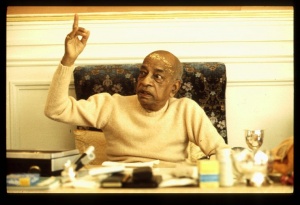SB 7.1.19: Difference between revisions
m (1 revision(s)) |
GitaJayanti (talk | contribs) No edit summary |
||
| Line 1: | Line 1: | ||
{{info | {{info | ||
|speaker=King | |speaker=King Yudhiṣṭhira | ||
|listener= | |listener=Nārada Muni | ||
}} | }} | ||
[[Category:Srimad-Bhagavatam - Canto 07 Chapter 01]] | |||
[[Category:Bhagavatam Verses Spoken by Yudhisthira Maharaja - Vanisource|070119]] | |||
<div style="float:left">'''[[Srimad-Bhagavatam]] - [[SB 7|Seventh Canto]] - [[SB 7.1: The Supreme Lord Is Equal to Everyone|Chapter 1: The Supreme Lord Is Equal to Everyone]]'''</div> | |||
<div style="float:right">[[File:Go-previous.png|link=SB 7.1.18]] '''[[SB 7.1.18]] - [[SB 7.1.20]]''' [[File:Go-next.png|link=SB 7.1.20]]</div> | |||
{{RandomImage}} | |||
==== TEXT 19 ==== | ==== TEXT 19 ==== | ||
<div | <div class="verse"> | ||
śapator asakṛd viṣṇuṁ | :śapator asakṛd viṣṇuṁ | ||
yad brahma param avyayam | :yad brahma param avyayam | ||
śvitro na jāto jihvāyāṁ | :śvitro na jāto jihvāyāṁ | ||
nāndhaṁ viviśatus tamaḥ | :nāndhaṁ viviśatus tamaḥ | ||
</div> | </div> | ||
| Line 17: | Line 22: | ||
==== SYNONYMS ==== | ==== SYNONYMS ==== | ||
<div | <div class="synonyms"> | ||
''śapatoḥ''—of both Śiśupāla and Dantavakra, who were blaspheming; ''asakṛt''—repeatedly; ''viṣṇum''—Lord Kṛṣṇa; ''yat''—which; ''brahma param''—the Supreme Brahman; ''avyayam''—without diminution; ''śvitraḥ''—white leprosy; ''na''—not; ''jātaḥ''—appeared; ''jihvāyām''—on the tongue; ''na''—not; ''andham''—dark; ''viviśatuḥ''—they did enter; ''tamaḥ''—hell. | |||
</div> | </div> | ||
| Line 24: | Line 29: | ||
==== TRANSLATION ==== | ==== TRANSLATION ==== | ||
<div | <div class="translation"> | ||
Although these two men—Śiśupāla and Dantavakra—repeatedly blasphemed the Supreme Personality of Godhead, Lord Viṣṇu [Kṛṣṇa], the Supreme Brahman, they were quite healthy. Indeed, their tongues were not attacked by white leprosy, nor did they enter the darkest region of hellish life. We are certainly most surprised by this. | Although these two men—Śiśupāla and Dantavakra—repeatedly blasphemed the Supreme Personality of Godhead, Lord Viṣṇu [Kṛṣṇa], the Supreme Brahman, they were quite healthy. Indeed, their tongues were not attacked by white leprosy, nor did they enter the darkest region of hellish life. We are certainly most surprised by this. | ||
</div> | </div> | ||
| Line 31: | Line 36: | ||
==== PURPORT ==== | ==== PURPORT ==== | ||
<div | <div class="purport"> | ||
Kṛṣṇa is described by Arjuna in Bhagavad-gītā ([[BG 10.12]]) as follows: paraṁ brahma paraṁ dhāma pavitraṁ paramaṁ bhavān. "You are the Supreme Brahman, the supreme abode and purifier." Herein this is confirmed. Viṣṇuṁ yad brahma param avyayam. The Supreme Viṣṇu is Kṛṣṇa. Kṛṣṇa is the cause of Viṣṇu, not vice versa. Similarly, Brahman is not the cause of Kṛṣṇa; Kṛṣṇa is the cause of Brahman. Therefore Kṛṣṇa is the Parabrahman (yad brahma param avyayam). | Kṛṣṇa is described by Arjuna in ''Bhagavad-gītā'' ([[BG 10.12-13 (1972)|BG 10.12]]) as follows: ''paraṁ brahma paraṁ dhāma pavitraṁ paramaṁ bhavān''. "You are the Supreme Brahman, the supreme abode and purifier." Herein this is confirmed. ''Viṣṇuṁ yad brahma param avyayam''. The Supreme Viṣṇu is Kṛṣṇa. Kṛṣṇa is the cause of Viṣṇu, not vice versa. Similarly, Brahman is not the cause of Kṛṣṇa; Kṛṣṇa is the cause of Brahman. Therefore Kṛṣṇa is the Parabrahman (''yad brahma param avyayam''). | ||
</div> | </div> | ||
__NOTOC__ | |||
<div style="float:right; clear:both;">[[File:Go-previous.png|link=SB 7.1.18]] '''[[SB 7.1.18]] - [[SB 7.1.20]]''' [[File:Go-next.png|link=SB 7.1.20]]</div> | |||
__NOTOC__ | |||
__NOEDITSECTION__ | |||
Revision as of 06:56, 25 May 2021

A.C. Bhaktivedanta Swami Prabhupada
TEXT 19
- śapator asakṛd viṣṇuṁ
- yad brahma param avyayam
- śvitro na jāto jihvāyāṁ
- nāndhaṁ viviśatus tamaḥ
SYNONYMS
śapatoḥ—of both Śiśupāla and Dantavakra, who were blaspheming; asakṛt—repeatedly; viṣṇum—Lord Kṛṣṇa; yat—which; brahma param—the Supreme Brahman; avyayam—without diminution; śvitraḥ—white leprosy; na—not; jātaḥ—appeared; jihvāyām—on the tongue; na—not; andham—dark; viviśatuḥ—they did enter; tamaḥ—hell.
TRANSLATION
Although these two men—Śiśupāla and Dantavakra—repeatedly blasphemed the Supreme Personality of Godhead, Lord Viṣṇu [Kṛṣṇa], the Supreme Brahman, they were quite healthy. Indeed, their tongues were not attacked by white leprosy, nor did they enter the darkest region of hellish life. We are certainly most surprised by this.
PURPORT
Kṛṣṇa is described by Arjuna in Bhagavad-gītā (BG 10.12) as follows: paraṁ brahma paraṁ dhāma pavitraṁ paramaṁ bhavān. "You are the Supreme Brahman, the supreme abode and purifier." Herein this is confirmed. Viṣṇuṁ yad brahma param avyayam. The Supreme Viṣṇu is Kṛṣṇa. Kṛṣṇa is the cause of Viṣṇu, not vice versa. Similarly, Brahman is not the cause of Kṛṣṇa; Kṛṣṇa is the cause of Brahman. Therefore Kṛṣṇa is the Parabrahman (yad brahma param avyayam).